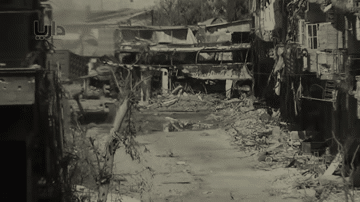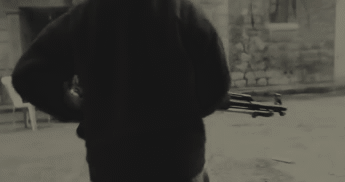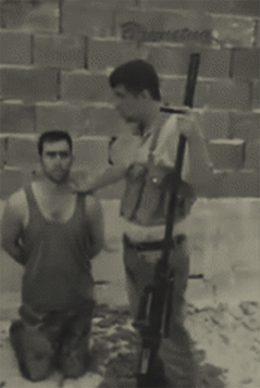Projects
Ventriloquism
A project by Ali Cherri
In 1955 Bertolt Brecht published kriegsfibel or War Primer. It is a collection of World War II photographs clipped from newspapers and magazines, under which Brecht has placed his own quatrains: four-line poems with an abab rhyme structure. A 'primer' is an elementary textbook that serves as an introduction to an area of study, so clearly Brecht was seeing a didactic function for his book. He states in his introduction how, in the hands of the bourgeoisie, photography has become:
...a weapon against truth. (…) The immense quantity of images that is spewed out daily from the printing presses and appears to bear the stamp of truth in fact serves merely to obfuscate the way things are.[1]
Ventriloquism projects Brecht's voice on short YouTube clips coming from Syria. These videos on loop cite images that have become part of the collective memory of the viewer. Desaturating this appropriated imagery anonymizes the material, blurs its borders, and forces images to mix with the words on the page. This montage of word/image does not attempt to expose how war representation has little changed over time, or to portray the circularity of history. It's a confrontation that is not set to uncover singular hidden 'truth', but rather to produce a third, self-aware subjectivity: that of the spectator-reader.
In 1955 Bertolt Brecht published kriegsfibel or War Primer. It is a collection of World War II photographs clipped from newspapers and magazines, under which Brecht has placed his own quatrains: four-line poems with an abab rhyme structure. A 'primer' is an elementary textbook that serves as an introduction to an area of study, so clearly Brecht was seeing a didactic function for his book. He states in his introduction how, in the hands of the bourgeoisie, photography has become:
...a weapon against truth. (…) The immense quantity of images that is spewed out daily from the printing presses and appears to bear the stamp of truth in fact serves merely to obfuscate the way things are.[1]
Ventriloquism projects Brecht's voice on short YouTube clips coming from Syria. These videos on loop cite images that have become part of the collective memory of the viewer. Desaturating this appropriated imagery anonymizes the material, blurs its borders, and forces images to mix with the words on the page. This montage of word/image does not attempt to expose how war representation has little changed over time, or to portray the circularity of history. It's a confrontation that is not set to uncover singular hidden 'truth', but rather to produce a third, self-aware subjectivity: that of the spectator-reader.
|
|
|
|
|
|
|
|
|
|
|
|
|
|
|
|
|
|
|
|
|
|
To read an interview with Ali Cherri for Platform 006, follow this link.
[1] Bertolt Brecht, War Primer, trans. John Willett, Libris, London, 1998.



























